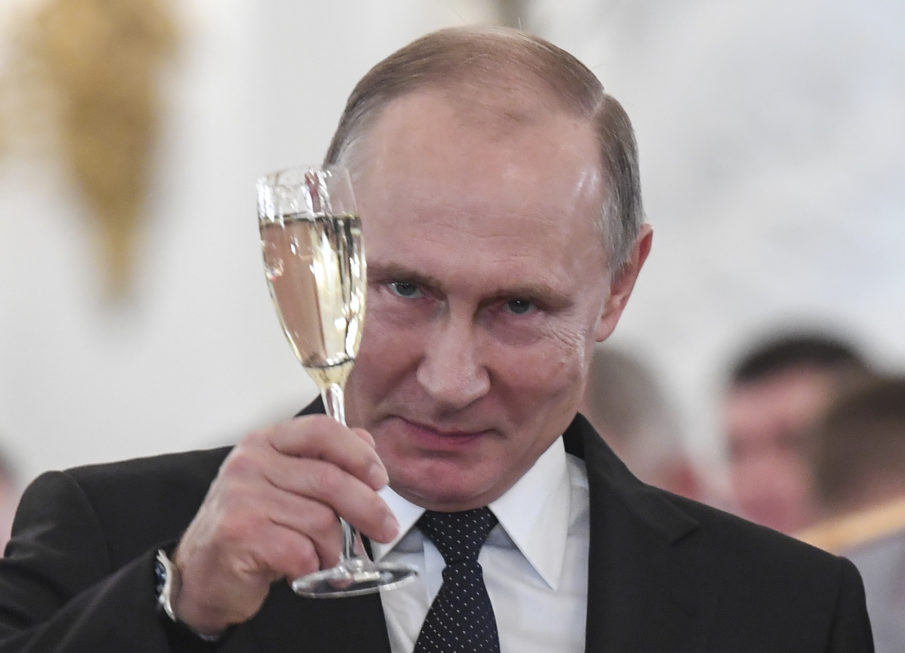Russian President Vladimir Putin delivered his annual Christmas and New Year’s addresses to world leaders over the weekend. Among a laundry list of talking points in the series of greetings, Russia’s leader called for “pragmatic cooperation” between his nation and the United States, and similar diplomatic efforts with other NATO nations that have seen heightening tensions with the Russian state in recent years.
According to Putin, who is seeking re-election in Russian presidential elections in the coming year, “a constructive Russian-American dialogue is especially needed to strengthen strategic stability in the world.”
In his message of greetings to President of the United States of America Donald Trump, Mr Putin noted, among other things, his strong belief that in the current challenging international environment, it is especially important for Russia and the US to engage in constructive dialogue with a view to enhancing global strategic stability and finding the best solutions to the global challenges and threats. The President of Russia stressed the importance of the principles of equality and mutual respect as the foundation for developing bilateral relations,” the Kremlin said.
“This would allow us to make progress in promoting pragmatic cooperation designed for the long term,” the greeting reads.
Putin made similarly positive remarks to the British Monarch, Queen Elizabeth, and Prime Minister Theresa May. The Russian leader reportedly “pointed out that closer Russian-UK cooperation would be in the basic interests of the Russian and British people and Europe as a whole,” according to the Kremlin.
Despite the friendly seeming overtures in his holiday addresses, relations between the United States and Russia this year have been at their worst since the Cold War.
In Europe, NATO member states have continued their defensive buildup, particularly in and around the Baltics, stemming from Russia’s military annexation of Crimea in 2014. Repeated air intercepts between NATO jets and Russian military aircraft over the Baltic and Black Seas, as well as Russia’s massive Zapad military exercises held in the region with ally Belarus, continued to escalate concerns about Russian military aggression throughout the year.
In Syria, where the United States and Russia have found themselves on opposing sides of the nation’s civil war, but loosely united in the fight against ISIS, Russia has continued to levy unsubstantiated accusations at American forces, claiming the U.S. military has been supporting the terrorist group in the interest of destabilizing the nation. On multiple occasions this year, Russia has released “evidence” to support their claims, only to have that evidence proven fake or incorrect soon thereafter.
Putin seemed to address his support for Syrian president Bashar al Assad in the face of U.S. opposition directly in his holiday address to the embattled president, saying Russia would continue to assist Syria “in upholding its state sovereignty, unity and territorial integrity, and promoting a political settlement and economic recovery.”
North Korea, which has been one of the focal points of President Trump’s administration in 2017, has also been a tension point between the two states. Russia, which shares a short land border with North Korea, has seen an uptick in trade with the nation since the United States and United Nations began pushing for the economic isolation of Kim Jong Un’s regime following a slew of banned nuclear and ballistic missile tests.
Putin himself even stated in no uncertain terms that he’d like to see an end to all sanctions imposed on the reclusive state, perhaps in part due to the economic stagnation his country has faced as a result of sanctions imposed after the aforementioned Crimean annexation.
Already have an account? Sign In
Two ways to continue to read this article.
Subscribe
$1.99
every 4 weeks
- Unlimited access to all articles
- Support independent journalism
- Ad-free reading experience
Subscribe Now
Recurring Monthly. Cancel Anytime.


COMMENTS